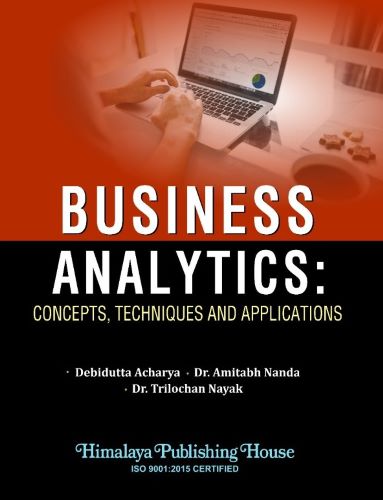In an era where data is hailed as the “new oil,” business analytics has emerged as a critical discipline that bridges the gap between data and decision-making. The ability to extract insights, predict outcomes, and prescribe actions from vast data reserves is no longer a luxury but a necessity for businesses aiming to thrive in today’s competitive environment.
This book, Business Analytics: Concepts, Techniques, and Applications, is designed to equip learners with the essential knowledge and skills to navigate the complexities of modern analytics. It integrates foundational concepts, practical tools, and advanced techniques, ensuring a comprehensive learning experience for both beginners and professionals.
We begin by laying a solid groundwork of business analytics concepts—descriptive, predictive, and prescriptive—alongside their application to informed decision-making. To make this learning journey actionable, we delve into tools like R programming and exploratory data analysis (EDA), focusing on developing data management and visualisation skills. Beyond foundational knowledge, the book introduces advanced techniques such as regression, classification, clustering, and time-series forecasting, supported by real-world examples across marketing, finance, and supply chain management.
Moreover, the book addresses emerging trends, such as artificial intelligence, real-time analytics, and edge computing, along with the ethical considerations critical to building sustainable and responsible analytics practices. The section on ethics and privacy, coupled with insights into evolving data protection regulations, equips readers with the understanding needed to navigate the challenges of the digital age.
Whether you are an MBA student, a budding data analyst, or a business leader seeking to harness the power of analytics, this book will serve as a valuable resource. By combining theoretical insights with practical applications.
Contents –
1. Foundations of Business Analytics: Concepts, Frameworks and Data Management
1.1 Introduction
1.2 Importance and Role of Business Analytics
1.3 Evolution of Business Analytics
1.4 Business Analytics Life Cycle: A Detailed Overview
1.5 Types of Analytics: Descriptive, Predictive and Prescriptive
1.6 Business Analytics Framework and Applications
1.7 Data Management and Governance: Data Collection, Cleaning, Integration, DataWarehousing and ETL Process
1.8 Data-Driven Business Models: Understanding the Value of Data in Modern Business
1.9 Case Study (2 in No.)
1.10 Self Assessment Questions
2. R Programming for Data Exploration, Visualisation, and Predictive Modelling
2.1 Introduction
2.2 Introduction to R Programming
2.3 Descriptive Analytics Techniques
2.3.1 Exploratory Data Analysis (EDA)
2.3.2 Descriptive Statistical Techniques
2.3.3 Data Visualisation and Reporting: Turning Data into Actionable Insights
2.4 Predictive Analytics Techniques
2.4.1 Regression Analysis
2.4.2 Classification Models
2.4.3 Time-Series Forecasting
2.4.4 Clustering: Detailed Explanation
2.4.5 Neural Networks for Prediction: An In-Depth Analysis
2.5 Prescriptive Analytics: A Detailed Exploration
2.5.1 Optimisation Model in Prescriptive Analytics
2.5.2 Simulation Model in Prescriptive Analytics
2.5.3 Decision Tree Model in Prescriptive Analytics
2.5.4 Machine Learning Model in Prescriptive Analytics
2.6 Case Study
2.7 Self Assessment Questions
3. Big Data Analytics: Frameworks, Technologies and Strategic Business Applications
3.1 Introduction
3.2 Big Data Analytics Framework and Technologies: A Detailed Exploration
3.3 Big Data Analytics: Industry Applications
3.3.1 Retail Analytics: Unlocking Business Insights
3.3.2 Health Care Analytics: Revolutionising Patient Care and Operational Efficiency
3.3.3 Logistics and Transportation Analytics: Enhancing Efficiency and Performance
3.4 Marketing Analytics: An In-Depth Exploration
3.5 Financial Analytics: Detailed Overview
3.6 Supply Chain Analytics: A Comprehensive Overview
3.7 Customer Segmentation: A Detailed Analysis
3.8 Churn Analysis: Understanding and Mitigating Customer Attrition
3.9 Risk Management in Data Analytics
3.9.1 Case Studies in Risk Analytics with Practical Insights
3.10 Real-World Case Studies in Business Analytics
3.11 Case Study
3.12 Self Assessment Questions
4. Emerging Trends and Ethical Considerations in Business Analytics
4.1 Introduction
4.2 Emerging Trends in Business Analytics: Artificial Intelligence (AI) and Machine Learning (ML)
4.3 Real-Time Analytics: Transforming Decision-Making in the Modern Era
4.4 Edge Computing: Decentralised Data Processing for Real-Time Insights
4.5 Ethics and Privacy in Business Analytics
4.6 Data Protection Regulations: An In-Depth Analysis
4.7 Ethical Decision-Making in Analytics
4.8 The Future of Business Analytics
4.9 Case Study
4.10 Self Assessment Questions







